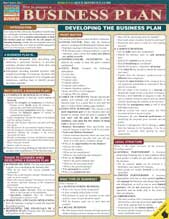23 September 2006
How To Write A Business Plan For Your Business
So you've reached that stage where you're ready to get your home business started in every way except one: you need money. Whether it comes from a loan or from investors doesn't really make too much difference, since there's one thing that they all need to see before they'll give you a cent. That thing is your business plan.
Think of your business plan as being like a list of answers to questions that people might have about your home business. You will not get outside funding without one, because the people giving you the funding want to know that you've thought through what you're doing. A business plan says to them 'I've considered this from every angle, and here's what I've come up with'.
What is Your Service? This is the first question every business plan should answer. Just what is it that you plan to do? Tell them which industry you're going to be in, and why you've chosen it.
Who are Your Customers? Once you know what you do, the next thing you need to know is who you're going to be doing it for, and so that's the next thing that should be written on the business plan. You should also include your area here.
What Makes You Different? You need to say what the 'key factors' are that make your business different to other businesses in its sector. What is it that you're planning to do to make the business succeed?
What are Your Expenses? Your start-up expenses include any equipment that you need before you can get up-and-running, while your day-to-day expenses are staff costs and supplies.
To finish it all off, you should include a breakdown of projected profit and loss per month for the first year of the business, in the form of a graph. You would work this out by working out a reasonable repayment of any one-off expenses and adding this repayment to the day-to-day expenses, before graphing day-to-day expenses against projected sales. Your business plan should show you making enough of a profit each month to live - if you doesn't, then it will be considered unfeasible by anyone you show it to.
The best way to figure out the dos and don'ts of business plans is to find real ones - they're out there on the Internet. Once you've seen a few, you can start to get some idea of how much work is going to be involved to write one of your own. Remember, until your business exists for real, the business plan is the only tool you have to show anyone how great it's going to be.
i got this from http://www.executivebusinessbooksummaries.com/

5 comments:
stock in tech:
1)how to trade in stock by jesse livermore -- lost but not forgotten, commit suiside and the book allow u to elicit both explicit and tacit knowledge from the dead man if u learn NLP before
2)murphy, technical analysis (this is evne the textbook for CMT exam) -- a book every seriosu trader must have in his library
3)elliot wave (pretcher) -- also textbook for CMT level 3. i support the first part of the book but anti fibonancai and gann fan
4)william J oniel - he got 3books, i got all, but i only recomemend the tickest book (forget the name), but the cup and handle pattern, u can have a look and drink some coffee
5) Martin J pring -- this guy also sell a lot of book, i got 3 only, damn but i only recomend the psychology or market. this book on tehcnical explained couldnt comp0ete with murphy standard, so forget it
6) alexander -- welcome into my trading room. a book to enhance ur perspective from a true trader and academician point of view.
7) kapanese candlestick by steve nison --> the orriginal KFC from the master of candle and stick.
8) charts that sticky -- RM50 but constantly remind u on the true face of tech.
9 and 10) if u dun like book number 8, then this market wizard, got 3 books, (that is the 3 books i have, perhaps in the market got more that i havent read before, so i cant help) u must read it.
of coz, got may other book not bad, gerald appel tech analysis of MACD, the wat wat chart pattern encyclopedia, encyclopedia of tech anaysis by XXX (even i also foreget the name) abd many more --> but these are merely copying from each other in my perspective...or they are similar and good for beginner only
a true trader undertsand math and chart cant go anywhere, it is the emotion and feeling of certainty, a sum of trading expericnes with true and real money (best even ur firend and parents money)... which make me recommeend these 10 books above
fundamental, ok lah, i type until very high now, i share more with luoiss although his blog looked damn cham and not professional
fundamenatal
1) inteliggent investor
2) common stock and uncommon prfoit
3) irrational exurebance (this is even the textbook for CFA level 3)
4) 2 of the peter lynch books)
5)
6) alchemy of finance by soros
7) martin zweig
8) all CFA level 1
9) all CFA level 2
10) all CFA level 3
hope u enoy reading it...
oh, forget to say, if anyone interested to read, go buy from MPH or amazon lah, my book simply not "pinjam"able...
ok lah, since so happy today, i share with u wat martin zweig say lah...
i use any thing that work, no matter it is fundamental or technial. "if eat shit also can earn money in market, i will start eating shit also"
(kakaka, the last part i add one)
Woi, booffett, tak aci lah like that...
You asked 10 books for success
Now you go and break them into more categories.
Apalah!???
Post a Comment